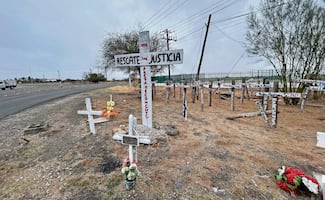Más Información

Sarampión mantiene a México en semáforo "naranja profundo, sin llegar al rojo", asegura Narro Robles en Con los de Casa

Libros de texto cimentaron una educación colonial y eurocentrista: Nadia López; esta es su tesis sobre pueblos afrodescendientes

Educación mediática y homologar nombres de dependencias, las iniciativas de Sergio Mayer; desata polémica tras pedir licencia
Parents of 43 college students who disappeared in 2014 called Thursday for the firing of the head of Mexico's criminal investigation agency, the AIC, for what they called missteps in the investigation.
Human rights groups that represent the parents issued a statement in which the parents asked that Tomás Zerón "be fired from his post at the AIC so that he can be investigated for crimes related to obstruction of justice."
The attorney general's office, which oversees the AIC, said in a statement that it had opened an investigation through its internal affairs unit.
Earlier, a group of experts from the Inter-American Commission on Human Rights said Zerón did not adequately document the discovery of charred bone fragments in a river where the students' remains were supposedly dumped.
The experts don't agree with that hypothesis. The bone fragments are the only physical evidence tying the students to the garbage dump where they were supposedly burned by members of a drug gang.
Questions about how the bones were found, whether on the 28th or 29th of October 2014, and by whom have thrown the government's case into doubt.
Even Zerón acknowledges some bone fragments were registered as being found a day before they actually were. One of the bone fragments was later matched by DNA tests to one of the students.
The experts on Thursday criticized Zerón's trip to the river on Oct. 28 with a detained suspect who was allegedly tortured.
Zerón has defended his actions and said the suspect was not tortured. He stood by the governments account that the bags of bone fragments were found in the river by divers on Oct. 29
The experts said Zerón's trip to the town of Cocula in Guerrero state should be investigated because it was unclear if he should have had custody of the suspect or if he was the correct person to go there to check out reports of bones being in the river. It was also unclear why outside experts were not immediately advised of the find.
Some said a public magistrate, not Zerón, should have been involved in the investigative trip.
Noticias según tus intereses
[Publicidad]
[Publicidad]










